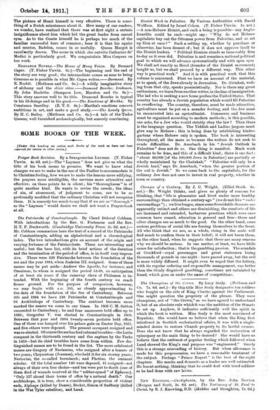The Patriarchs of Constantinople. By Claud Delaval Cobham. With introductions
by the Rev. G. Fortescue and the Rev. H. T. F. Duckworth. (Cambridge University Press. 2s. 6d. net.)— Mr. Cobham summarizes here the text of a record of the Patriarchs of Constantinople, adding an alphabetical and a chronological index. The two introductions give an account of the origin and varying fortunes of the Patriarchate. These are interesting and useful ; but the bare list, with its brief notices of the duration and the termination of the period of office, is in itself very impres- sive. There were 329 Patriarchs between the foundation of the see and the year 1884, when Joakeim III. resigned. Some of these names may be put aside—Andrew the Apostle, for instance, and Onesimus, to whom is assigned the period 54-68, an anticipation of at least six years if the runaway slave of Philemon is in- tended. With the beginning of the fourth century we reach firmer ground. For the purpose of comparison, however, we may begin with A.D. 595, as closely approximating to the date of the foundation of the See of Canterbury. Between 595 and. 1884 we have 248 Patriarchs at Constantinople and 94 Archbishops of Canterbury. The contrast becomes more marked the nearer we come to our times. In 1805 C. IL Sutton succeeded to Canterbury; he and four successors held office up to 1883; Gregorius V. was elected to Constantinople in 1806. Between that year and 1884 twenty-seven prelates held office. One of these was hanged over his palace gate on Easter Day, 1821, and five others were deposed. The present occupant resigned and was re-elected. Of course the see has had external troubles—the Latin conquest in the thirteenth century and the capture by the Turks in 1453—but its chief troubles have come from within. Few dis- tinguished names are to be found in the list. The more celebrated names are Gregory of Nazianzus, who resigned after a tenure of two years; Chrysostom (Joannes), who held it for six stormy years; Nestorius, the so-called heresiarch ; and Photius, the eminent scholar. Of the total number 140 were deposed, 41 resigned—not always of their own free choice—and ten were put to death (one of them died of wounds received at the " robber-synod " of Ephesus). "Only 137 closed their terms of office by a natural death." Our archbishops, it is true, show a considerable proportion of violent ends, Alphege (killed by Danes), Becket, Simon of Sudbury (killed In the Wat Tyler rebellion), and Land.


















































 Previous page
Previous page